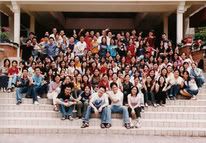Cover letters: types and samples
The guidelines here apply to both hard copy correspondence and email.The main difference between email and hard copy correspondence is format:
your signature block (address, etc.) goes below your name in email, while it goes at the top of the page on hard copy. Of course you won't have a handwritten signature on email, but don't forget this on hard copy.
~~~~~~~~~~~~~~~~~~~~~~~~~~~~~~~~~~~~~~~~~~~~~~~~~~~~~~~
E-mail in your job search
Use e-mail in your job search when an employer specifically invites or instructs you to do so (on a web site, in verbal conversation, etc.); or let the employer initiate e-mail contact.
Include your e-mail address on your resume and on the address block of your hard-copy letters so employers can initiate e-mail contact with you.
The same rules of hard copy correspondence apply to business e-mail. See guidelines for correspondence in your job search.
An obvious advantage of e-mail is that you can correspond much more quickly and don't need to be concerned with paper quality, envelopes, and postage, as you would with hard copy correspondence.
The speed and convenience of e-mail is an advantage to busy employers as well. The degree to which e-mail is used will depend on the types of employers with whom you are dealing.
Be aware that e-mail is a form of written communication and it creates a written record. Retain copies of the e-mail you send and receive. Don't let the speed and ease of sending e-mail blind you to the fact that you will be judged on what you say and how you say it. E-mail, like other written correspondence, doesn't reveal your tone of voice. Choose your words carefully.
~~~~~~~~~~~~~~~~~~~~~~~~~~~~~~~~~~~~~~~~~~~~~~~~~~~~~~
All cover letters should:
Explain why you are sending a resume.
Don't send a resume without a cover letter.
Don't make the reader guess what you are asking for; be specific:
Do you want a summer internship opportunity, or a permanent position at graduation; are you inquiring about future employment possibilities?
Tell specifically how you learned about the position or the organization —
a flyer posted in your department, a web site, a family friend who works at the organization. It is appropriate to mention the name of someone who suggested that you write.
Convince the reader to look at your resume;
the cover letter will be seen first. Therefore, it must be very well written and targeted to that employer.
Call attention to elements of your background —
education, leadership, experience — that are relevant to a position you are seeking. Be as specific as possible, using examples.
Reflect your attitude, personality, motivation, enthusiasm, and communication skills.
Provide or refer to any information specifically requested in a job advertisement that might not be covered in your resume, such as availability date, or reference to an attached writing sample.
Indicate what you will do to follow-up.
In a letter of application —
applying for an advertised opening — applicants often say something like "I look forward to hearing from you." However, it is better to take the initiative to follow-up, saying something like, "I will contact you in the next two weeks to see if you require any additional information regarding my qualifications."
In a letter of inquiry —
asking about the possibility of an opening — don't assume the employer will contact you. You should say something like, "I will contact you in two weeks to learn more about upcoming employment opportunities with (name of organization)." Then mark your calendar to make the call.
for example of cover letter please refer to the following site
Cover Letter Format Guidelines



0 Comments:
Post a Comment
<< Home